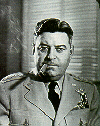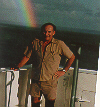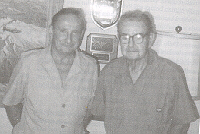


The following letter was sent to Michael Theroux at Borderlands magazine in response to comments by Trevor James Constable that appeared previously in the magazine. Constable wrote The Cosmic Pulse of Life and many other books that built upon his interpretation of the work of Wilhelm Reich. He also was an associate of Curtis LeMay, an important World War II figure who also ran as George Wallace's vice-presidential candidate in 1968. Constable once told interviewer Tom Brown that "I knew Wallace would be assassinated and Curtis LeMay would be president...We had a chance to have a completely honest gentleman as president." Here, Constable expounds upon his relationship with LeMay in a letter that never made it into Borderlands. Borderlands is a remarkable alternative science journal that can be found in the Link Tank below.
Dear Borderlands
I enjoyed the current issue a great deal, especially
Trevor James Constable's reflections on the fate of weather
engineering after he passes, which hopefully will not happen
until much later than he seems to anticipate. He can certainly
take some credit for the continued interest in Reich's
atmospheric engineering work, although in his own work it went
through some mighty interesting changes. Constable makes his
point well, though, that the environmental needs remain constant,
or actually get worse as time moves along, thus ensuring
continued interest in various forms of climate control.
Borderlands should discuss with Constable in more detail his
relationship with Curtis LeMay, touched upon in the book he
mentions,
Kenn Thomas

From letterhead of: RAYMOND F. TOLIVER, Col. USAF (Ret.) TREVOR J. CONSTABLE Authors and Historians
Kenn "Steamshovel" Thomas wants more detail on my relationship with the late General Curtis LeMay. Kenn's statement that I "did a kind of cloudbusting work with LeMay" is a somewhat inaccurate description of the work we did. our activities did not involve cloudbusting or cloudbusters in any way whatsoever.
The General became involved with me during my Operation Clincher in the 1990 Southern California smog season. Complete detail of the Clincher operation was provided in the Journal of Borderland Research after its successful conclusion. Suffice it to say here that Clincher administered the worst knock to Southern California smog that it had ever received in a single season in history, right across the statistical spectrum, EXACTLY AS FILED IN ADVANCE WITH N.O.A.A. Nobody else has ever given such advance notice, and objectively fulfilled such an undertaking in providing clean air, anywhere.
Clincher shook the smog bureaucracy and all the crooked politicians, neurotic lawyers and greedy businessmen to whom "fighting" smog is financially or organizationally beneficial, and to whom its eradication is the worst nightmare. Fourteen operating bases and the crucial personal intervention of General Curtis LeMay were required to bring this off. Each base was equipped with one or more "Spider" etheric vortex generators. No cloudbusters were employed.
To organize Clincher and secure operating sites over a four- county area, I had to call in all my markers. I managed to get locations everywhere except Riverside. That region became my bete noir because of its numerous smog emergencies in previous seasons. Smog shifts into Riverside and concentrates there from areas farther west.as each day advances past the noon hour. Assistance was denied me in Riverside from the Chamber of Commerce on down. Things like this happen when you have a new idea, capable of frightening little men. This was a dismal and desperate experience, for it put the success of Clincher in jeopardy.
The late Arthur Libby Neff had a highly effective Spider at his home in Pasadena, where it was making unprecedented inroads on smog. He suggested that we take my problem to General Curtis LeMay, who lived in Riverside. "You can't miss with him" said Art Neff, "he's got all your aviation books and he knows who you are." Colonel Raymond.F. Toliver USAF Ret., my co-author on military books for over 30 years, had been one of General LeMay's briefing officers at the Pentagon. He confirmed that the General knew that I was his literary partner, and would listen to me without prejudice.
A meeting was arranged at the General's Riverside home. Today, Kenn Thomas sees Curtis LeMay only as one "who hardly qualifies as the unarmored hero against the anticivilization." When I went to see the General I was not interested in such esoteric aspects of LeMay as Kenn mentions, but only in getting vital assistance. I knew that LeMay was not just an outstanding military leader, but, in the words of Barry Goldwater, was a "can-do" guy, somebody who went right at a project and got it done before ordinary guys got off their tails. The General and I exchanged pleasantries about numerous mutual friends in aviation, including Germany's General Adolf Galland, whose official biography I had just completed, and to which General LeMay had kindly contributed a dust jacket blurb, via Art Neff.

The General listened skeptically but carefully to what I told him about the smog reduction project. A gleam came into his eyes when I described the total lack of cooperation by Riverside political and business leaders. Leaving an introductory videotape with him I departed, with an invitation to return in two days.
As an aviation historian and author, I well knew about the fire-bombing of Tokyo. I well knew also about the bombing of Pearl Harbor, and the rape of Manila, and the Bataan Death March. Military people must do what their governments require. As long as war is not abolished, for which abolition MacArthur was the world's most effective advocate, one is blessed to have straight-ahead, honest leadership and competence like that of General LeMay. Their raison d'etre since antiquity has been to win their countries' wars. Solid soldiers and patriots like LeMay would be anathema to today's dishonest engineers of world political control, and wars without victories.
Central to my personal assessments of such people as I encounter on earth, is my conviction that the Laws of Karma ensure that all debts are paid and weighed in the Cosmic scale. Human evaluations of people and events are of little karmic force or effect, and nobody -- but nobody -- "gets away" with anything. Thus it is not within my purview to hold the firebombing of Tokyo against Curtis LeMay. I have also limned the lives of numerous German fighter pilots of World War II on the same basis, finding all of them to be exceptional men, regardless of what their duties in war required them to do. Life is too short to expend it in a search for perfection.
I actively supported Wallace/LeMay in 1968, because I distrust establishment politicos, such distrust becoming total by 1997. Wallace and LeMay were convulsing all the electoral projections. Most importantly, I knew Curtis LeMay was the first straight-shooter to run on.a presidential ticket in the U.S. in decades. I love honest men. I was also in no doubt that George Wallace, were he to win, would be assassinated by America's unelected rulers. That would make Curtis LeMay president.
People who might still blanch from such an honest straight-shooter running America, should take a good look at contemporary Washington, jumping with political thuggery and rotten with corruption. Give me President Curtis LeMay any day.
General LeMay was waiting for me on his front lawn when I returned to his home. He looked at me beadily. There was no igood morning'. On the contrary, he waved an admonishing finger at me, as though annoyed. He went right to the point. "You never convinced me one bit with that videotape," he said. "Not one bit." There was an awkward pause. "But I want one of those damned smog things of yours in my backyard," he blurted. When I pulled out a Mark II Spider from my car, he helped me install it in his patio. The former Chief of Staff of the USAF and founder of the Strategic Air Command, was good with tools, a natural tinkerer. When the Spider was set up, I had him pass the palm of his left hand across the apex of one of the projector cones. He immediately reacted to the subtle emission, passing his hand incredulously across the truncated apex of the cone, time after time. His mouth fell open. "My God," he said. He tried the same procedure on the twin cone. This time there was a more forceful expletive.